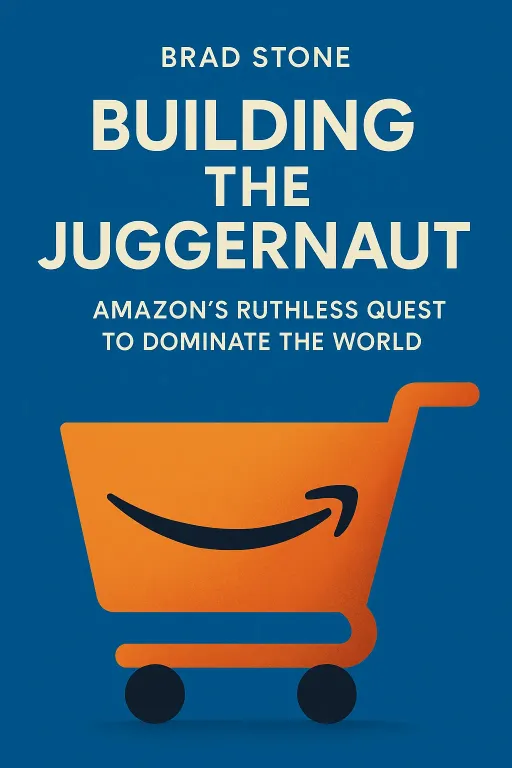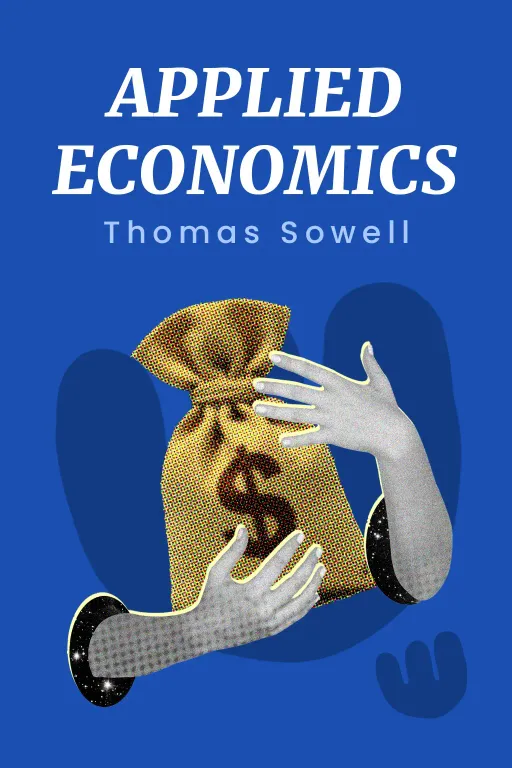
Amazon's Dark Playbook
10 minAmazon's Ruthless Quest to Own the World and Remake Our Lives
Golden Hook & Introduction
SECTION
Joe: Most of us think Amazon won because it offered us low prices and fast shipping. But what if the real secret to its success was a strategy to systematically bleed its competitors dry, sometimes by losing millions of dollars on purpose? Lewis: Whoa, that’s a bold claim. I mean, I just think of them as the place I get my dog food and batteries from in under 24 hours. You're saying there's a darker playbook? Joe: A much darker playbook. That's the explosive core of The Everything War: Amazon's Ruthless Quest to Own the World and Remake Our Lives by Dana Mattioli. Lewis: Mattioli… she's the Wall Street Journal reporter, right? The one who's been breaking all those Amazon stories for years? Joe: Exactly. She was a finalist for the Pulitzer Prize for her Amazon coverage. This book is the culmination of years of deep-dive investigative work, based on hundreds of interviews with insiders, competitors, and ex-employees. It's been widely acclaimed for its rigor. Lewis: I've seen some of the buzz. It seems pretty polarizing. Some readers call it a masterpiece of investigative journalism, others a total 'hatchet job' because it's so relentlessly critical. Joe: Well, with a title like The Everything War, you’re not expecting a love letter. And Mattioli argues that from day one, Amazon wasn't just building a business; it was building a weapon. Lewis: Okay, I'm hooked. Where does this war begin?
The Juggernaut's Blueprint: Growth, Loopholes, and a 'Killer Instinct'
SECTION
Joe: It all starts with a mantra that Wall Street somehow bought into for decades: 'Growth over Profits.' While other retailers had to show they were making money every quarter, Jeff Bezos convinced investors to let him burn cash for years, as long as Amazon was getting bigger. Lewis: How did he pull that off? Investors usually want to see black ink, not red. Joe: He sold them a vision of total future dominance. He argued that to win the internet, you had to get big, fast. And one of his first strategies was exploiting a massive loophole: sales tax. For years, Amazon didn't have to collect sales tax in most states, giving it an instant price advantage of 5-10% over every local bookstore and Main Street shop. Lewis: I remember that! Things just felt cheaper on Amazon. But that feels like a simple price advantage. You mentioned bleeding competitors dry. Joe: That's where it gets much more aggressive. A perfect example Mattioli details is the story of a company called Quidsi, which owned Diapers.com. In the late 2000s, they were a huge success story. They had cracked the code on selling baby products online and had a fiercely loyal following of new moms—a demographic Amazon desperately wanted. Lewis: Okay, so a classic turf war. Joe: More like a siege. Amazon executives created a twelve-step plan to crush Quidsi. They didn't just match their prices; they launched a program called Amazon Mom, offering Prime memberships and a staggering 30% discount on diapers and wipes. They were losing an estimated $100 million over three months just in the diaper category. Lewis: That's insane. They were willing to lose a hundred million dollars just to hurt one competitor? How is that even legal? Joe: Because at the time, Amazon had such a small share of the diaper market, their lawyers determined it wouldn't trigger antitrust alarms. It was predatory pricing in spirit, but not in the eyes of the law. The final blow came when Quidsi was looking for a buyer, and Walmart was interested. An Amazon executive told Quidsi's bankers that if they sold to anyone else, Amazon would drop its diaper prices to zero. Lewis: Come on. That's a straight-up threat. Joe: It was. Quidsi felt they had no choice. They sold to Amazon for $545 million. A few years later, Amazon shut them down, claiming they were unprofitable. But the real goal was achieved: they had acquired Quidsi's customers and eliminated a brilliant competitor. Lewis: Wow. So the low prices I see aren't always about efficiency or smart logistics. Sometimes, they're a weapon designed to leave a crater where a competitor used to be. Joe: Exactly. And that weapon gets even more powerful once they've built the arena.
The Platform as a Weapon: Copying, Squeezing, and Corporate Espionage
SECTION
Joe: This brings us to the core conflict Mattioli uncovers: Amazon isn't just a store, it's the mall itself. And the mall owner is spying on all the shops inside. Lewis: What do you mean by that? Joe: Over half of the items sold on Amazon are from third-party sellers—small businesses, entrepreneurs, people who built their livelihoods on the platform. But Amazon is also their biggest competitor. The book is filled with stories of sellers who create a hit product, only to see an identical 'Amazon Basics' version pop up a few months later at a lower price. Lewis: I’ve always wondered about that. How do they do it so fast? Joe: Mattioli's reporting, based on internal documents, reveals that Amazon's private label teams were systematically using proprietary data from third-party sellers. They could see a seller's revenue, their marketing costs, their profit margins—everything. It's like playing poker, but you get to see everyone else's cards. Lewis: That’s not just competition, that sounds like cheating. Can you give me an example? Joe: There's a damning one about a small company called Fortem that created a bestselling car trunk organizer. Internal documents showed an Amazon employee pulled a detailed report on Fortem's sales—over a hundred thousand units sold, $3.5 million in revenue. The report even included their marketing spend per unit. A few months later, an Amazon Basics trunk organizer, strikingly similar, appeared on the site. Lewis: Unbelievable. And this extends beyond just physical products, right? The book mentions something about the Echo and Alexa. Joe: It does. Mattioli tells the story of a startup called Ubi, which created a voice-activated smart speaker before the Echo. They met with Amazon executives, signed an NDA, and gave them a full demonstration. The Amazon team seemed interested, then went silent. A year later, Amazon launched the Echo. The founder of Ubi was gutted. Lewis: That sounds like straight-up corporate espionage. Why would any startup even talk to them, then? Joe: That's the catch-22. They have to. Amazon's reach is so massive that for many startups, a partnership or getting on the platform is the only way to scale. They walk into the meeting hoping for a partnership, but they risk walking out having just handed over their roadmap to their biggest future competitor. The book frames Amazon's venture capital arm, the Alexa Fund, as a potential intelligence-gathering operation. Lewis: It’s a devil's bargain. You can't win with them, and you can't win without them. Okay, this is all pretty damning. Has anyone tried to stop this? Where are the regulators in all of this?
The Reckoning: Lina Khan, Congress, and the Battle for Amazon's Future
SECTION
Joe: That's where the story takes its most recent, dramatic turn. For decades, antitrust law was dominated by one idea, championed by a legal scholar named Robert Bork and the Chicago School of economics. The idea was called the 'consumer welfare standard.' Lewis: Okay, break that down for me. What does that mean? Joe: In simple terms, it means that as long as a company's actions lead to lower prices for consumers, it's generally considered legal. Big isn't necessarily bad. If a monopoly is efficient and passes those savings on to you and me, the law shouldn't intervene. Lewis: Ah, and that's Amazon's entire public defense, right? 'We have low prices, what's the problem?' Joe: Precisely. They marched toward monopoly by singing the tune of contemporary antitrust. But then, in 2017, a young law student named Lina Khan published a paper in the Yale Law Journal titled "Amazon's Antitrust Paradox." It completely turned the debate on its head. Lewis: What was her argument? Joe: She argued that the consumer welfare standard is blind to other forms of harm. It doesn't see predatory pricing, like the Diapers.com story. It doesn't see a platform using its power to crush the small businesses that depend on it. She drew a direct parallel between Amazon and the great monopolies of the Gilded Age, like Standard Oil. Lewis: And this got people's attention. Joe: It lit a fire under the 'techlash' movement. Suddenly, there was a new language to describe what people felt was wrong with Big Tech. This led to the big Congressional investigation in 2020. The CEOs of Apple, Google, Facebook, and Amazon were all called to testify. Lewis: I remember seeing clips of that. How did Bezos do? Joe: It was a pivotal moment. When asked directly if Amazon ever used third-party seller data to help its private-label business, Bezos gave a very lawyerly answer. He said, "I can't guarantee you that that policy has never been violated." Lewis: That is not a 'no.' That is a very loud 'I can't say no.' Joe: Exactly. And for Congress, that was a smoking gun. The investigation concluded that Amazon holds monopoly power and has engaged in anti-competitive conduct. And in a wild turn of events, a few years later, President Biden appointed Lina Khan—the author of that very paper—as the Chair of the Federal Trade Commission. Lewis: Wow. So the person who wrote the intellectual blueprint for taking on Amazon is now the one in charge of doing it. Joe: And in 2023, she did. The FTC, along with 17 states, filed a landmark lawsuit against Amazon, accusing it of being an illegal monopoly. That's the showdown the entire book builds towards.
Synthesis & Takeaways
SECTION
Joe: Ultimately, what Dana Mattioli's book argues so powerfully is that Amazon's dominance isn't a happy accident of innovation. It's the result of a deliberate, decades-long war on competition, waged with ruthless tactics that were often hidden in plain sight, disguised as 'customer obsession.' Lewis: And the FTC lawsuit feels like the final battle in that war. It’s not just about Amazon anymore. It’s a fight over the very rules of 21st-century capitalism. Joe: The lawsuit claims that Amazon's power over sellers forces them to use its expensive logistics and advertising services, which in turn drives up prices for all of us. So the very thing that was their shield for so long—low prices—is now at the heart of the case against them. Lewis: It really makes you think. As a consumer, every time I click 'Buy Now,' am I casting a vote for convenience, or am I helping build the Juggernaut? It's a tough question with no easy answer. Joe: It really is. The book doesn't offer simple solutions, but it forces you to see the hidden costs behind that one-click purchase. It's a trade-off we're all making, whether we realize it or not. Lewis: We'd love to hear what you all think. Does Amazon's convenience outweigh these concerns? Have you ever felt that tension as a shopper or maybe even as a seller? Let us know your thoughts on our social channels. Joe: It’s a conversation worth having. Lewis: This is Aibrary, signing off.









